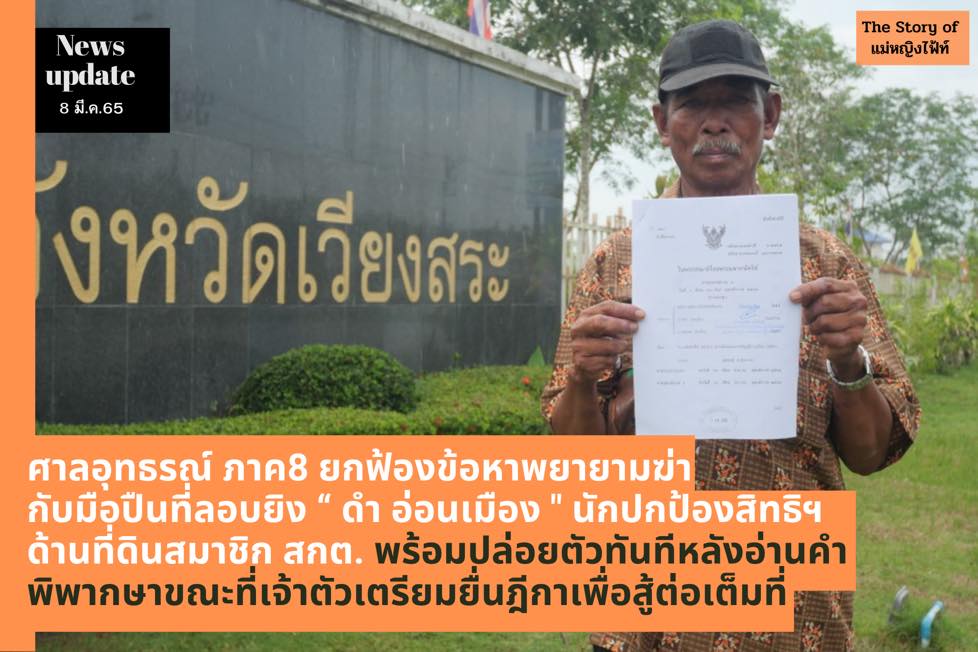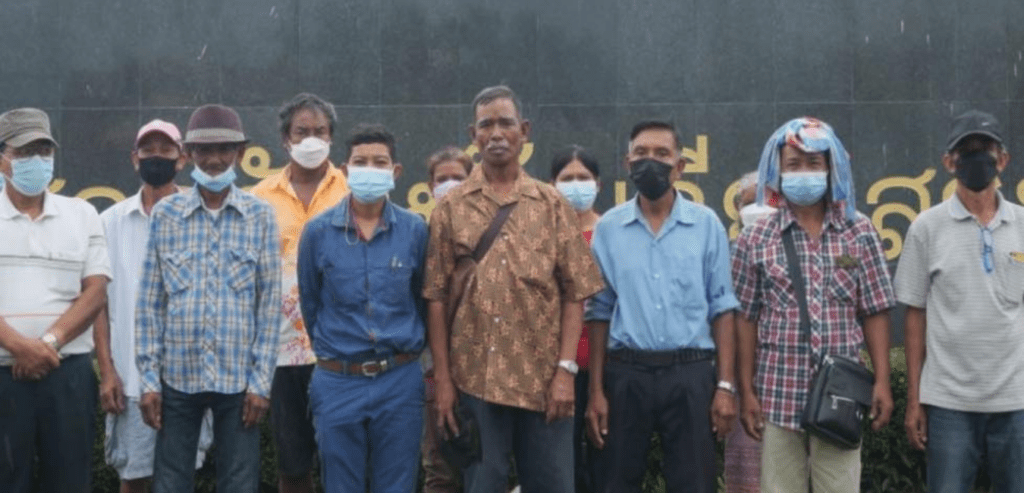Impunity Reigns as the Overall Security of Land Rights Defenders in Thailand is Further Undermined
The Wiang Sra Provincial Court of Surat Thani in Thailand just issued its verdict from the Region 8 Court of Appeals, acquitting the suspect in the attempted murder case against Mr Dam On-muang, land rights defender and member of The Southern Peasants’ Federation of Thailand (SPFT). The court ordered the immediate release of the accused. Lawyers were disappointed with the verdict that overturned the lower court’s guilty verdict. They are preparing to appeal to the Supreme Court, while Mr On-muang is determined to fight for justice.
On 8 March 2022, at 09.00 am, Mr On-muang, along with 20 other land rights defenders were at the Wiang Sra Provincial Court to hear the verdict of the Appeals Court. Mr Somphon Chimrueng, accused of the shooting of Mr On-muang, has appealed the lower court’s verdict in which he was sentenced to 13 years and six months in prison for attempted murder. Mr Chimrueng was also charged with violating the Firearms Act and ordered to pay Mr On-muang 30,000 baht (approximately 800 euros) in damages. The defendant paid the 30,000 baht.
Since Mr. Chimrueng and Mr. On-muang lived in the same village, and based on statements and evidence about the condition of the crime scene, the court decided that Mr Chimrueng did not have the intention to kill Mr On-muang.
According to the court, the assailant could have shot Mr On-muang immediately at the spot near where he was lying and had the opportunity to shoot him again to make sure he was dead. Moreover, given that the bullet hit the bed on which Mr. On-muang was lying, about 30-50 centimeters from his head, and the shell casings found were placed in a direction parallel to the bed, Mr. Chimrueng’s defense thus said that his intention was simply to fire the bullets to intimidate the land rights defender. Based on the evidence provided, it cannot be assumed that Mr Chimrueng intended to murder Mr On-muang. The Court of Appeal in Region 8, convinced by the evidence of the accused, decided to set aside the previous judgment and acquit Mr Chimrueng of attempted murder.
Curiously, Mr On-muang’s lawyer said that the reading of the verdict did not take officially place on 8 March 2022. She had been informed that the court had already read the verdict on 18 February 2022 in the absence of Mr On-muang and only in the presence of the accused. This was unusual as Mr On-muang, the co-plaintiff and the victim in this case, was not called by the court nor by the prosecutor to attend the verdict reading on 18 February 2022. He only received a letter from the court asking him to appear on 8 March 2022. The right of the co-plaintiff, Mr On-muang, was violated as all parties ought to be present at all hearings of the Appeals Court. Mr Chimrueng was released on 18 February 2022 and he is living his normal life in his village.

Mr On-muang knew that something was amiss when he realized that Mr Chimrueng had been released from captivity and was living in his village, before receiving any notice from the court. He felt both shocked and terrified. He did not anticipate that the Appeals Court would rule to overturn the previous verdict. Although he respects the court’s decision, he feels disappointed and worried. Instead of being able to freely to the land and live in his community, he now has to concentrate on his safety.
During the hearing, the court established the requirement that any party wishing to appeal the decision must do so within one month from the day the verdict was read in court. The verdict for Mr On-muang was not read to him until 8 March 2022, but Mr Chimrueng, heard the verdict in February, which unjustly narrowed the period for Mr On-muang to take action.
As a co-plaintiff, Mr On-muang will lodge an appeal motion with the Supreme Court. “I am now 72. I may not live much longer in this world. I am just worried that even after my death, the problems will not go away, and they interfere with the people in the community. Therefore, I decide to fight it with my head held high,” said Mr On-muang.
Ms Pranom Somwong, the country representative for Protection International in Thailand, said that she was shocked to hear the Appeals Court’s decision. She had never experienced an irregular reading of the verdict in this manner before, particularly with a case concerning the security of a human rights defender (HRD). In such cases, the safety of the injured party must be given the highest priority, in particular in regard to the injured party of a criminal case.
When the lower court convicted Mr Chimrueng and sent him to jail, justice was temporarily served. According to the circumstances, as explained to us by Mr On-muang and the eyewitness, we believe the victim, in this case, is one of attempted murder. The assailant made his way towards Mr On-muang by approaching him very closely before firing his weapon. The fact that the accused missed his target and did not achieve his objective does not mean that murder was not the intent.
Protection International will support Mr. On-muang through the process of appealing to the Supreme Court to ensure that human rights defenders receive justice and perpetrators are duly punished. Besides the attempted murder of Mr On-muang, there have been at least six assassination attempts on other members of the SPFT, resulting in the deaths of four members, including two women HRDs. To date, none of the perpetrators have been brought to justice and held accountable for their crimes. The police and prosecutors must answer to the public about how they have conducted their investigations and why the criminal procedure code has failed to bring the perpetrators to justice. Why is the government unable to provide protection and prevent the killing, attempted killings, and harassment of human rights defenders? If this situation continues, who will benefit from it?
For more information about this case, please review the previous articles published by Protection International.


